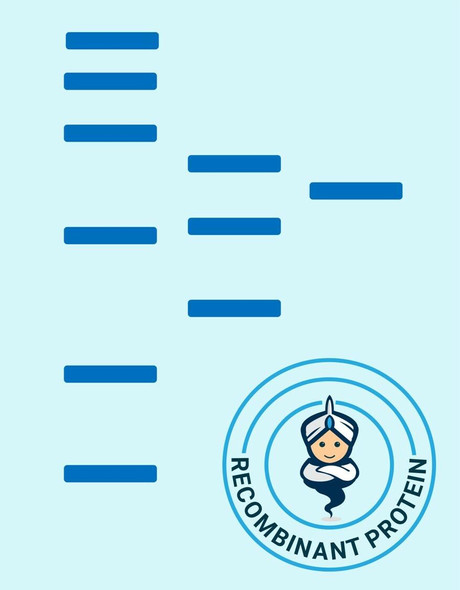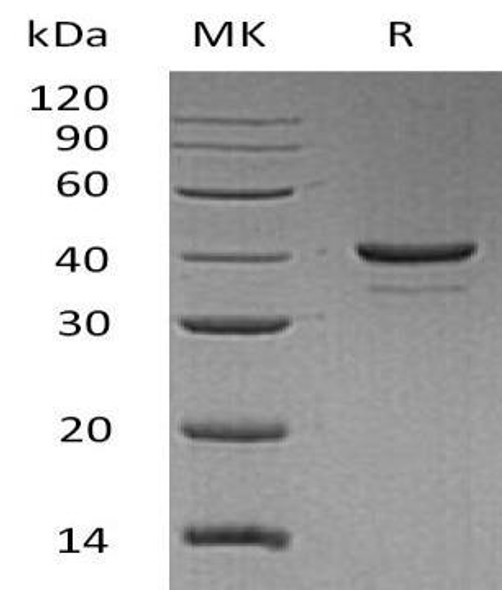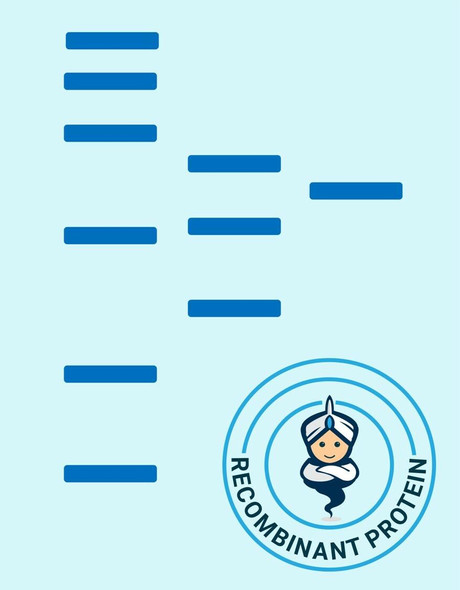Cytokines Recombinant Proteins
Human Resistin Recombinant Protein (RPPB0928)
- SKU:
- RPPB0928
- Product Type:
- Recombinant Protein
- Species:
- Human
- Uniprot:
- Q9HD89
- Research Area:
- Cytokines
Description
| Product Name: | Human Resistin Recombinant Protein |
| Product Code: | RPPB0928 |
| Size: | 25µg |
| Species: | Human |
| Target: | Resistin |
| Synonyms: | Cysteine-rich secreted protein FIZZ3, Adipose tissue-specific secretory factor, ADSF, C/EBP-epsilon-regulated myeloid-specific secreted cysteine-rich protein, Cysteine-rich secreted protein A12-alpha-like 2, RSTN, XCP1, RETN1, MGC126603, MGC126609. |
| Source: | Escherichia Coli |
| Physical Appearance: | Sterile filtered colorless solution. |
| Formulation: | Resistin protein solution is supplied in 20mM Tris-HCl pH 8.0, 5mM EDTA and 50% glycerol. |
| Stability: | Store at 4°C if entire vial will be used within 2-4 weeks. Store, frozen at -20°C for longer periods of time.Please avoid freeze thaw cycles. |
| Purity: | Greater than 95% as determined by SDS-PAGE. |
Resistin, a product of the RSTN gene, is a peptide hormone belonging to the class of cysteine-rich secreted proteins which is termed the RELM family, and is also described as ADSF (Adipose Tissue- Specific Secretory Factor) and FIZZ3 (Found in Inflammatory Zone). Human resistin contains 108 amino acids as a prepeptide, and its hydrofobic signal peptide is cleaved before its secretion. Resistin circulates in human blood as a dimeric protein consisting of two 92 amino acid polypeptides, which are disulfide-linked via Cys26.Resistin may be an important link between obesity and insulin resistance. Mouse resistin, specifically produced and secreted by adipocyte, acts on skeletal muscle myocytes, hepatocytes and adipocytes themselves so that it reduces their sensitivity to insulin. Steppan et al. have suggested that resistin suppresses the ability of insulin to stimulate glucose uptake. They have also suggested that resistin is present at elevated levels in blood of obese mice, and is down regulated by fasting and antidiabetic drugs. Way et al., on the other hand, have found that resistin expression is severly suppressed in obesity and is stimulated by several antidiabetic drugs.Other studies have shown that mouse resistin increases during the differentiation of adipocytes, but it also seems to inhibit adipogenesis. In contrast, the human adipogenic differentiation is likely to be associated with a down regulation of resistin gene expression.
Resistin Human Recombinant produced in E.Coli is a single, non-glycosylated, Polypeptide chain containing a 92 amino acids fragment (17-108) of the mature Human Resistin, having a total molecular mass of 14.23kDa and fused with a 4.5kDa amino-terminal hexahistidine tag. The Resistin is purified by proprietary chromatographic techniques.
| UniProt Protein Function: | resistin: Hormone that seems to suppress insulin ability to stimulate glucose uptake into adipose cells. Potentially links obesity to diabetes. Belongs to the resistin/FIZZ family. |
| UniProt Protein Details: | Protein type:Secreted, signal peptide; Secreted Chromosomal Location of Human Ortholog: 19p13.2 Cellular Component: extracellular space; nucleus Molecular Function:hormone activity Biological Process: fat cell differentiation; response to mechanical stimulus; positive regulation of smooth muscle cell proliferation; positive regulation of smooth muscle cell migration; positive regulation of synaptic transmission; aging; response to insulin stimulus Disease: Diabetes Mellitus, Noninsulin-dependent |
| NCBI Summary: | This gene belongs to the family defined by the mouse resistin-like genes. The characteristic feature of this family is the C-terminal stretch of 10 cys residues with identical spacing. The mouse homolog of this protein is secreted by adipocytes, and may be the hormone potentially linking obesity to type II diabetes. Alternatively spliced transcript variants encoding the same protein have been found for this gene. [provided by RefSeq, Jul 2010] |
| UniProt Code: | Q9HD89 |
| NCBI GenInfo Identifier: | 18202962 |
| NCBI Gene ID: | 56729 |
| NCBI Accession: | Q9HD89.1 |
| UniProt Secondary Accession: | Q9HD89,Q540D9, Q76B53, D6W649, |
| UniProt Related Accession: | Q9HD89 |
| Molecular Weight: | 8,686 Da |
| NCBI Full Name: | Resistin |
| NCBI Synonym Full Names: | resistin |
| NCBI Official Symbol: | RETN�� |
| NCBI Official Synonym Symbols: | ADSF; RSTN; XCP1; FIZZ3; RETN1�� |
| NCBI Protein Information: | resistin; resistin delta2; found in inflammatory zone 3; cysteine-rich secreted protein FIZZ3; adipose tissue-specific secretory factor; cysteine-rich secreted protein A12-alpha-like 2; c/EBP-epsilon-regulated myeloid-specific secreted cysteine-rich protein; C/EBP-epsilon regulated myeloid-specific secreted cysteine-rich protein precursor 1 |
| UniProt Protein Name: | Resistin |
| UniProt Synonym Protein Names: | Adipose tissue-specific secretory factor; ADSF; C/EBP-epsilon-regulated myeloid-specific secreted cysteine-rich protein; Cysteine-rich secreted protein A12-alpha-like 2; Cysteine-rich secreted protein FIZZ3 |
| Protein Family: | Resistin |
| UniProt Gene Name: | RETN�� |
| UniProt Entry Name: | RETN_HUMAN |






